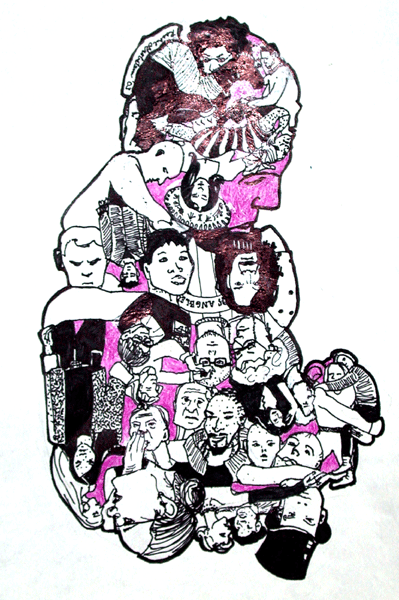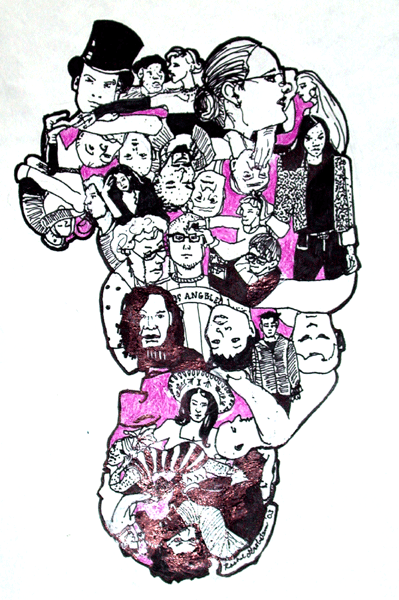Made available on Serendip
In association with Making Sense of Diversity: An Exploration, a world wide conversation

|
September 30, 2005
Michelle Mancini, Amy Craiger, Val Jankowski and Jackney Prioly
"Governing Ourselves: Does the System Support Everyone?"
Participants
Summary
Prepared by Anne Dalke
Additions, revisions, extensions are encouraged
in the
On-Line Forum
| 
|
Michelle opened the discussion by asking participants to free associate about the ideas which arose when they thought of "diversity" and "self-governance." How can the structures of self-governance become more diverse, better reflecting the make-up of the college? Why is it so hard to change traditions that are, traditionally, so exclusive? Some of the reasons are logistical and bureaucratic--it's hard to keep up to date. Students only have a four-year memory; they don't have the long view. Some of the problems are matters of efficiency: we can't streamline the process of incorporating all ideas; this takes time. The current tactics work well for the majority, so where will the real will to change come from? How to motivate altering a system so that it won't cater to your own needs? There was discussion about the need to address systemic problems (rather than attack people); there was a counterclaim that each of us bears personal responsibility for reinforcing the sysem, for perpetuating its ideals by "who we hang out with" and "how we speak to others." Rules are variously interpreted and easily manipulated.
Asked to identify systems and practices we find exclusionary, participants spoke of the need to rely on the administration, when it appears that one's peers do not have one's own best interests at heart. Why do the issues of some people get ignored, and others attended to? What makes an outsider an insider? How do we think other people think about us? There are structures in place that aren't taken advantage of; why is that? How can the system be less exclusionary, if people don't avail themselves of such resources ?
Discussion turned to descriptions of current work being done to revise the Honor Code procedures; for instance, students will soon be required to use other available resources, before bringing a case to the social honor board. But should we be forced to do this? For whom are such structures imperative? Is this building a Catch-22 into the system? Will some students find it an "easy road" to use these resources, while others will feel trapped and pushed into a corner? This is a question of accountability: Whose fault is it, if such opportunities are not taken advantage of? Is the blame mutual? How many of these resources are "people like me? Are they on my side? Do they feel what I feel? Are they people we can count on?" Students think they can't talk and don't they feel safe, either with their peers, or with mentors who don't look like them, or see the world the way they do. How much does race play into this felt sense of danger? How realistic are these fears, how ridiculous these projections? Why can't we trust each other to speak honestly and openly? Can we re-evaluate our expectations of one another?
For instance, SGA operates by Robert's Rules of Order. If you were "never schooled in what those rules are, you feel branded as less than intellectual." There are cultural and class differences among us, visible (and hearable) in our different ways of expressing our anger. In the context of the cultural traditions of Bryn Mawr, this means that some people's anger gets privileged over others; some forms of representing anger are allowable, while others are not. If one "doesn't phrase her emotions correctly," in other words, she will not be respected; she may not even be heard. This means that some expressions of anger are feared, experienced as threatening, dismissed, shut down as "rage," while others--such as more measured expressions of "being hurt"--are allowed, even encouraged. Being told to "just express it differently" has built into it certain class and cultural biases and presumptions which need to be re-examined. A range of forms of expression should be accomodated in confrontation. Our peer mediation skills are "thirty years old"; we need more progressive approaches. Our ultimate goal should be that we are all able to hear others' sides of things.
Conversation closed with some "food for thought":
- our traditions of governance are "not worth a hooey" if we don't look at them carefully
- "make early conversation," before it gets to the stage of mediation
- use/overuse/abuse the resources of the Graduate School in Social Work and Social Research,
where faculty are currently creating templates for conflict mediation - it helps to have someone "not in the mix of it" as a third ear; it is not a failure to invite them in.
Discussion is invited to continue further in the on-line forum on "Making Sense of Diversity," and will resume in person after break, on Friday, October 21, when Ruth Conboy will lead a discussion entitled "One Size Does Not Fit All: Body Issues and Images."
| Return to Schedule for Friday Noon Conversations

| Bryn Mawr Conversations
| Archived
Forum
| Archive of Bryn Mawr Conversation
| General Conversation
| Serendip Home |
These pages are sponsored by the Bryn Mawr College Office
of Intercultural Affairs, the Center for Science and Society and the Serendip
website. Send us additional comments or suggestions at Serendip
© by Serendip 1994-
- Last Modified:
Wednesday, 21-June-2005 15:18:00 EST

